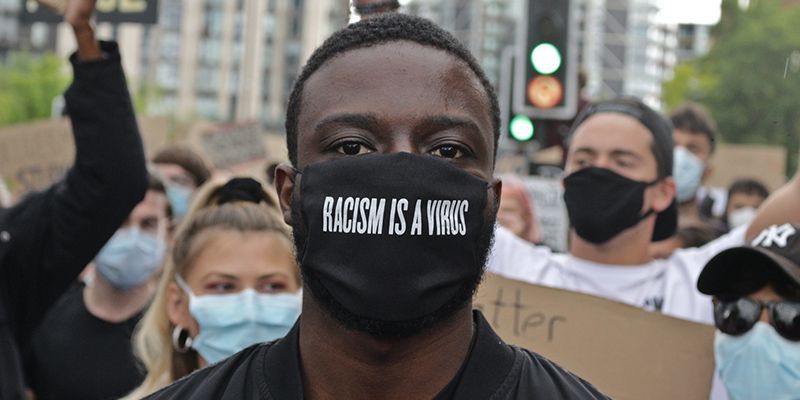
The ways in which discrimination is worsening the impact of COVID-19 on people in Black, Asian and minority ethnic (BAME) groups in the UK will be explored in a new research project.
Iyiola Solanke, Professor of EU Law and Social Justice in the University’s School of Law, has been awarded £2.5m to create the Consortium on Practices for Wellbeing and Resilience in Black, Asian and Minority Ethnic Families and Communities (Co-POWeR).
The funding has been granted by UK Research and Innovation (UKRI) via the Economic and Social Research Council.
Researchers will investigate the combined impact of COVID-19 and racial discrimination on wellbeing and resilience across these groups, aiming to create a fuller picture of the vulnerabilities of these communities.
“We want to illustrate that the way in which COVID-19 is exacerbating the experience of inequality for those in these communities.”
Beginning this month, the 18-month project will explore how emergency COVID-19 powers are disproportionately impacting people from BAME backgrounds and how the pandemic is affecting care and caring, as well as mental and physical health and wellbeing across all ages.
Using their findings, the team will make recommendations to policymakers on the interventions needed to support these groups. The team will also work with documentary filmmakers and theatre arts specialists to develop non-fiction and fiction outputs.
Professor Solanke, the project’s principal investigator, said: “There are two viruses affecting people from Black and Minority Ethnic communities across the UK. One is COVID-19 and the other is discrimination. We want to illustrate that the way in which COVID-19 is exacerbating the experience of inequality for those in these communities.
“The people in these communities have developed new strategies to promote their own wellbeing and resilience during the COVID-19 pandemic, but given the ongoing nature of the pandemic, official interventions are also needed to support them.
“There is agency – people are able to adapt and support themselves – but the combined impact of COVID means that government intervention is essential to ensure the ongoing wellbeing of people of all ages who are subjected to these two viruses.”
Co-POWeR is a multi-disciplinary consortium of nine academics from across the UK, eight of whom are members of the Black Female Professors Forum.
Joining Professor Solanke in the consortium are:
- Florence Ayisi, Professor of International Documentary Film from the University of South Wales
- Claudia Bernard, Professor of Social Work & Head of Postgraduate Research at Goldsmiths, University of London
- Gargy Bhattacharyya, Professor of Sociology at University of East London
- Anna Gupta, Professor of Social Work at Royal Holloway
- Raminder Kaur, Professor of Anthropology and Cultural Studies at the University of Sussex
- Monica Lakhanpaul, Professor of integrated Community Child Health at UCL (University College London)
- Shirin Rai, Professor of Politics and International Studies at the University of Warwick
- Maria Stokes, Professor of Musculoskeletal Rehabilitation at the University of Southampton.
Sabu Padmadas, Professor of Demography and Global Health at the University of Southampton, will be providing statistical expertise.
The researchers will form a People’s Commission to conduct interviews with people in BAME families and communities to establish what support is needed.
Professor Solanke said: “Empowerment is a key aspect of Co-POWeR. We want to get to the heart of what’s going on by listening to the voices of those in these families and communities. Only by hearing from them can we determine what support is required.
“The work will demonstrate why it is necessary to take an integrated, intersectional approach to understand the jostling, over-lapping challenges faced by these families and communities.
“We will use this evidence to make policy recommendations which best support BAME families and communities who are being subjected by COVID-19 to a complex cocktail of challenges to their everyday lives.”
UKRI Chief Executive Professor Dame Ottoline Leyser said: “The COVID-19 pandemic has exacerbated longstanding inequalities in health, employment and education in the UK.
“Emerging evidence suggests that people from Black, Asian and Minority Ethnic backgrounds have experienced the hardest economic shocks. We cannot ignore the social, cultural and economic factors that have shaped the experiences of Black, Asian and Minority Ethnic communities throughout the pandemic.
“It is crucial that we understand the depth and breadth of the impacts of these factors so that we can take action to alleviate the consequences for these communities.”
Read more about how people from BAME backgrounds have experienced the hardest economic shocks (PDF).
Further information
- For media enquiries, contact the University press office via pressoffice@leeds.ac.uk.
- Picture credit: Steve Easton (Flickr)